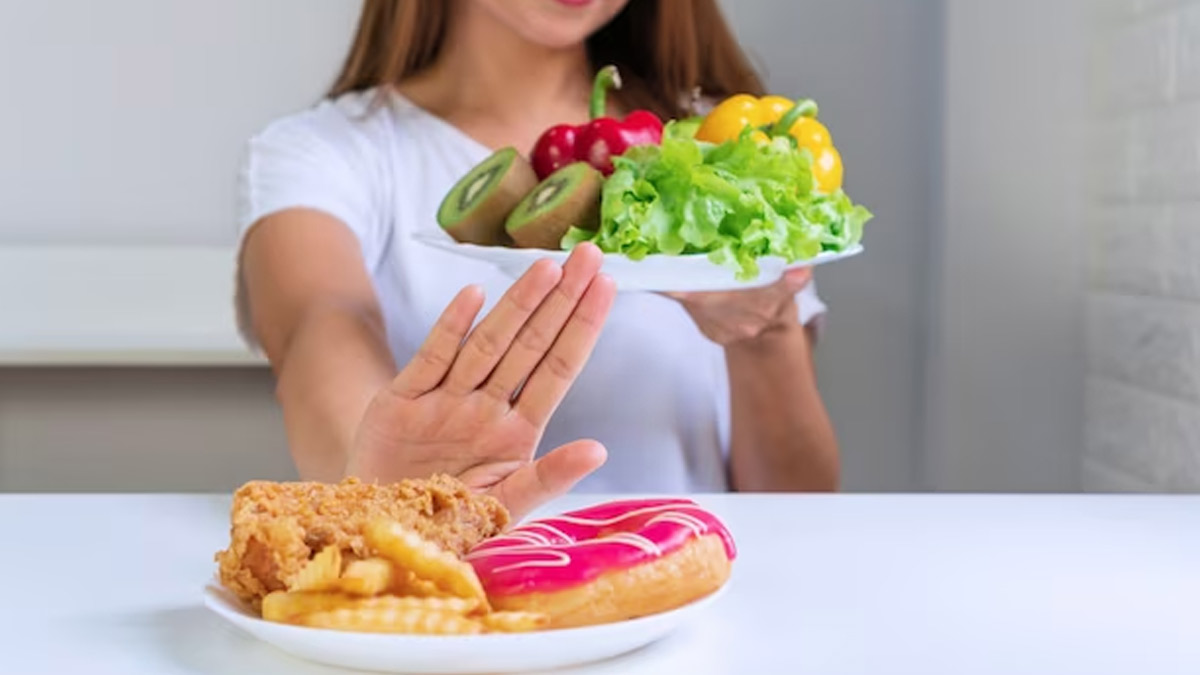
Have you ever noticed how some foods exacerbate menstrual symptoms while others may help alleviate menstrual cramps? The truth is that what you eat plays an important role in not only managing symptoms but also in promoting your overall well-being during menstruation. Understanding the impact of your food choices can help you make healthy decisions during this phase. We spoke to our expert Dr Ekta Singhwal, MSc Dietician, Ujala Cygnus Group of Hospitals, who listed foods you should eat and avoid during menstruation.
Table of Content:-
Foods to Eat During Periods

Iron-Rich Foods
Menstruation can lead to a loss of iron, hence consuming iron-rich foods into your diet can help replenish these stores. You should include lean meats, beans, lentils, and dark leafy greens like spinach.
Healthy Fats
"Omega-3 fatty acids, found in fatty fish, flaxseeds, and walnuts, can help alleviate menstrual cramps and reduce inflammation. Avocados and olive oil are excellent sources of healthy fats that contribute to overall well-being", informed Dr Singwal.
Complex Carbohydrates
During menstruation, you should choose whole grains like brown rice, quinoa, and oats. These complex carbohydrates provide a steady release of energy and help stabilise mood swings often experienced during menstruation.

Fruits and Vegetables
You should also eat plenty of fruits and vegetables during your menstruation. Dr Singhwal added, "They are packed with vitamins, minerals, and antioxidants, thus promoting nutrient boost and reducing cravings. Berries, citrus fruits, kale, and broccoli are excellent choices. These foods support immune function and help combat fatigue."
Also Read: Gaining Weight During Periods? Expert Explains Its Causes And Answers If It Is Normal
Hydrating Beverages
It is important to keep yourself hydrated, especially during menstruation. By doing so you can alleviate bloating, and reduce water retention and the chances of dehydration headaches during your periods. Also, avoid excessive caffeine, as it can contribute to increased anxiety and irritability.
Dark Chocolates
This tasty treat can help you manage your mood swings and give you an energy boost. Dark chocolate contains iron and magnesium and according to a study by the Iranian Journal of Nursing and Midwifery Research, magnesium was found to alleviate the severity of PMS symptoms.
Foods to Limit or Avoid

Highly Processed Foods
"You should resist the urge to indulge in highly processed foods, such as chips, cookies, and sugary snacks, as they can contribute to inflammation and bloating. They often lack essential nutrients and may lead to energy crashes", highlighted Dr Singhwal.
Caffeine and Carbonated Drinks
If you are a coffee lover, you’ll have to reduce its consumption as it can exacerbate anxiety and irritability. On the other hand, carbonated drinks may contribute to bloating, so consider limiting them during your period.
Salty Foods
Did you know high sodium levels can lead to water retention and bloating? Therefore, reduce your intake of salty snacks, processed foods, and restaurant meals during this time.
Fried and Fatty Foods
Fried and fatty foods may exacerbate inflammation and lead to discomfort. Therefore, choose healthier cooking methods, such as baking, grilling, or steaming.
Also Read: This Is Why You Get Cranky During Periods: Expert Lists The Causes And Management Strategies
Tips for a Healthier Menstrual Diet

Dr SInghwal listed some healthy dietary tips that you should follow during menstruation:
Balanced Meals
Aim for balanced meals that include a combination of protein, healthy fats, and complex carbohydrates. This helps stabilise blood sugar levels and maintain energy throughout the day.
Herbal Teas
Herbal teas, such as chamomile or ginger tea, can help soothe menstrual cramps and promote relaxation. Peppermint tea may aid in digestion and reduce bloating.
Small, Frequent Meals
Eating smaller, more frequent meals can help manage hunger and prevent energy crashes. This approach can also aid in digestion, reducing the likelihood of bloating.
Mindful Eating
Dr Singhwal emphasised, "It is important to be aware of your body's signals for hunger and fullness. Paying attention to these cues can help you regulate your food intake and maintain a healthy diet. It is important to be aware of your body's signals for hunger and fullness. Paying attention to these cues can help you regulate your food intake and maintain a healthy diet. Mindful eating can help you make healthier choices and foster a positive relationship with food during your period."
[Disclaimer: This article contains information provided by a registered healthcare professional and is for informational purposes only. We advise you to consult your dietician before making any changes to your diet, especially if you are dealing with any health conditions.]
Also watch this video
Read Next
Take Control of Your Menstrual Cycle: Doctor Shares Truth About Period Delaying Pills in Detail
How we keep this article up to date:
We work with experts and keep a close eye on the latest in health and wellness. Whenever there is a new research or helpful information, we update our articles with accurate and useful advice.
Current Version